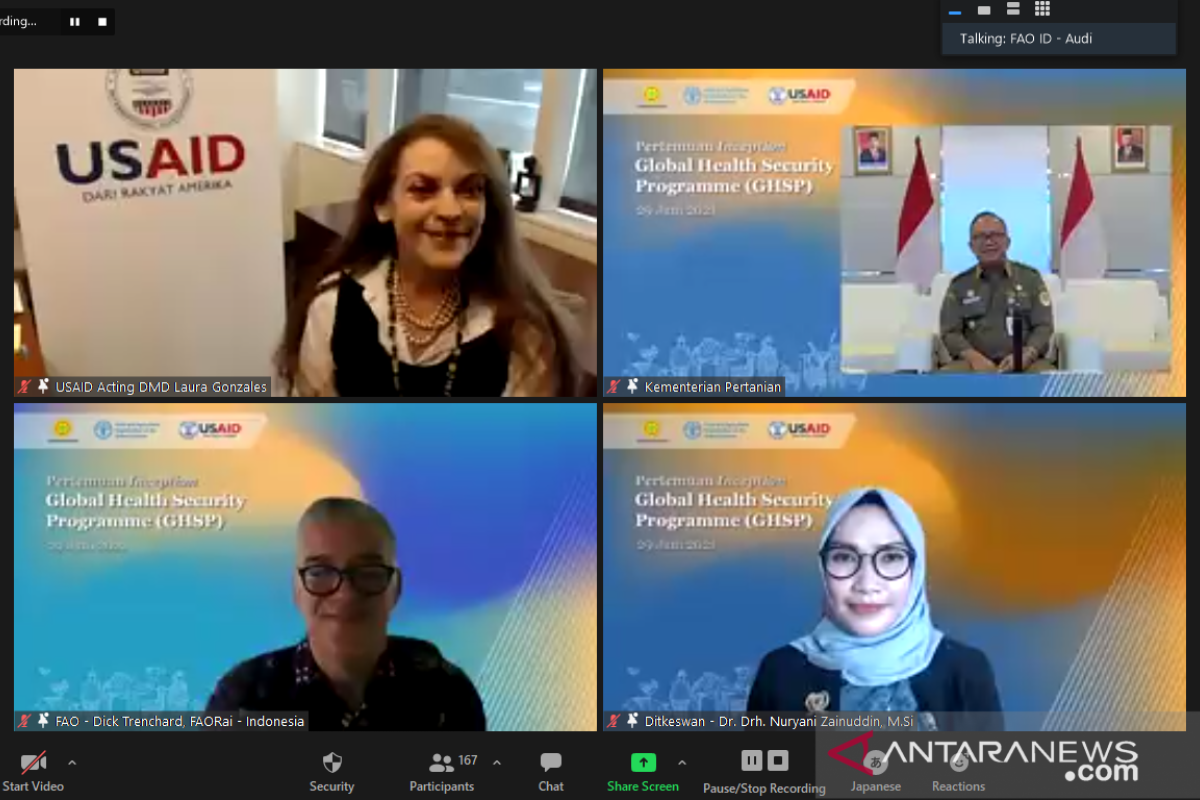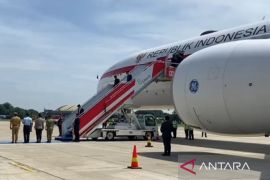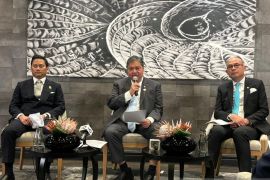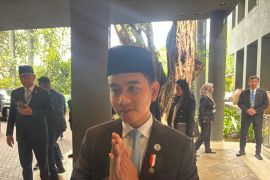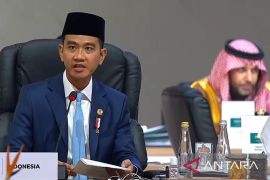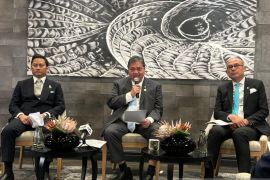The Global Health Resilience Program will reduce the risk of zoonoses and infectious diseases, antimicrobial resistance, and other biological threats by strengthening Indonesia's animal health system.Jakarta (ANTARA) - At the Global Health Summit earlier this year, President Joko Widodo had exhorted G20 countries to "take part to build a robust global health resilience architecture to deal better with similar threats (as COVID-19) in future".
"Therefore, global cooperation becomes an obligation," he remarked at the virtual summit held on May 21, 2021, according to the Cabinet Secretariat of Indonesia.
The 2021 Global Health Summit, which took place in the midst of the COVID-19 pandemic, was one of the G20 meetings held under the Italian Presidency. It was attended by G20 countries leaders, guest countries, and leaders of international organizations.
The summit resulted in the "Declaration of Rome" agreement, which incorporates the principles of multilateral cooperation and joint action to prevent future global health crises, with a commitment to build a healthier, safer, fairer, and more sustainable world.
Speaking at the summit, President Widodo affirmed that the principles in the "Declaration of Rome" are essential for building global health resilience.
These principles, he said, would be meaningless if not applied concretely. Implementation is key, and the world can only recover and become stronger if people do it together, as implied by 'Recover together and recover stronger', the theme for Indonesia's G20 Presidency next year, he added.
The COVID-19 pandemic has shown how infectious disease outbreaks can have a significant impact on health, economic, political, and social issues, he said. COVID-19 has spread in almost all countries of the world, and no country is fully prepared for the next pandemic, he pointed out.
Several pandemic threats are related to zoonotic diseases or animal diseases that infect humans, he pointed out. Therefore, the spread of these diseases is an issue of global priority, including for the government of Indonesia, he added.
At the end of June, 2021, Indonesia and 70 other G20 countries worked to boost political and multi-sectoral support for health resilience readiness through a global concept called the Global Health Security Agenda (GHSA), which aims to keep the world safe from infectious disease threats.
Related news: Indonesia launches Global Health Security Programme with FAO, USAID
Indonesia as a pioneer
To support GHSA, the Ministry of Agriculture, together with the Food and Agriculture Organization (FAO), through the Emergency Center for Transboundary Animal Diseases (FAO ECTAD) and the United States Agency for International Development (USAID), has officially launched the Global Health Security Program (GHSP) online.
According to Kementan's director general of livestock and animal health, Nasrullah, Indonesia is one of the pioneer countries of GHSA, and has actively contributed as a permanent member of the Steering Group for the 2016-2024 period.
President Widodo has also paid great attention to Indonesia's huge contribution to the global concept, he added.
The GHSA cooperation is aimed at preventing, detecting, and controlling new infectious diseases, especially those that have the potential to threaten health and economy in Indonesia, he explained.
Moreover, it expects to contribute to improving human health, food security, and public welfare, he added.
The program is also in line with the government's Medium-Term Development Plan (RPJM), especially in terms of food safety and health, he said.
It is hoped that this program would serve as an opportunity for strengthening joint commitment in order to move forward from the pandemic, Nasrullah remarked.
The Global Health Security Program (GHSP) has arisen from the Ministry of Agriculture's long-term collaboration with FAO ECTAD-USAID in preventing pandemics, he stated.
This cooperation began during the Avian (bird) Influenza (flu) pandemic in 2006, he added. Indonesia was the country with the most cases of the Avian Influenza virus subtype H5N1 until 2014.
While the number of bird flu cases in humans have decreased significantly, the H5N1 virus endemic is still a threat to the poultry industry and human health, Nasrullah said.
Other than bird flu, many regions in Indonesia are still endemic to zoonotic diseases, such as rabies and anthrax.
The GHSP, which will run for the next four years, will focus on technical support in four areas: multi-sectoral collaboration and policy development; surveillance, laboratory, and risk identification; alertness and disease response with One Health; and, national poultry health and antimicrobial resistance control.
Meanwhile, secretary general of the Ministry of Agriculture, Kasdi Subagyono, has expressed the hope that the GHSP program would synergize well with other projects of the ministry.
In this regard, the ministry has continued to ensure good administration in planning, implementation, and reporting, in accordance with the regulations, by adopting best practices and taking lessons from past projects, he said.
He also lauded the concerned institutions/agencies, associations, and international development partners, especially FAO Indonesia and USAID, for supporting and cooperating with the Indonesian government in efforts to strengthen sustainable national animal health services.
Hopefully, the efforts can help the achievement of Sustainable Development Goals (SDGs), he remarked.
Global support
According to FAO Representative ad interim for Indonesia, Richard Trenchard, the agency and USAID are working with the government to build capacity to prevent pandemic threats from zoonoses in Indonesia.
The country will be quick to respond and control zoonotic outbreaks, he affirmed.
Together with the Indonesian government, FAO is strengthening animal health capacity in many regions and providing training and technical support on disease surveillance, laboratory diagnostics, and outbreak reporting and investigation, as well as alertness and response through the One Health approach, he informed.
Apart from its serious impact on public health, Trenchard said, COVID-19 has disrupted food security and the world economy.
It has been projected that more than 132 million people have suffered globally because of COVID-19, he added.
The FAO does not want a global health crisis like this to happen again, Trenchard stressed adding, there is a need to detect potential outbreaks as early as possible, and FAO is always ready to work with Indonesia to respond early and effectively.
Meanwhile, USAID Indonesia acting deputy director Laura Gonzales said it was an honor for her organization to cooperate with Indonesia in dealing with emerging infectious diseases.
Through the One Health approach, USAID's Global Health Security Program will reduce the risk of zoonoses, infectious diseases, antimicrobial resistance, and other biological threats by strengthening Indonesia's animal health system, she said.
GHSP will build on the successes and lessons of COVID-19 response to upgrade detection, preparedness, and response capabilities of zoonosis and infectious diseases in Indonesia, she added.
Indonesia's commitment to global support is evidence that outbreaks and pandemics threats cannot be resolved partially. They require cooperation at the global level. (INE)
Related news: Health security to be Indonesia's diplomatic priority in 2021
Editor: Yuni Arisandy Sinaga
Copyright © ANTARA 2021
